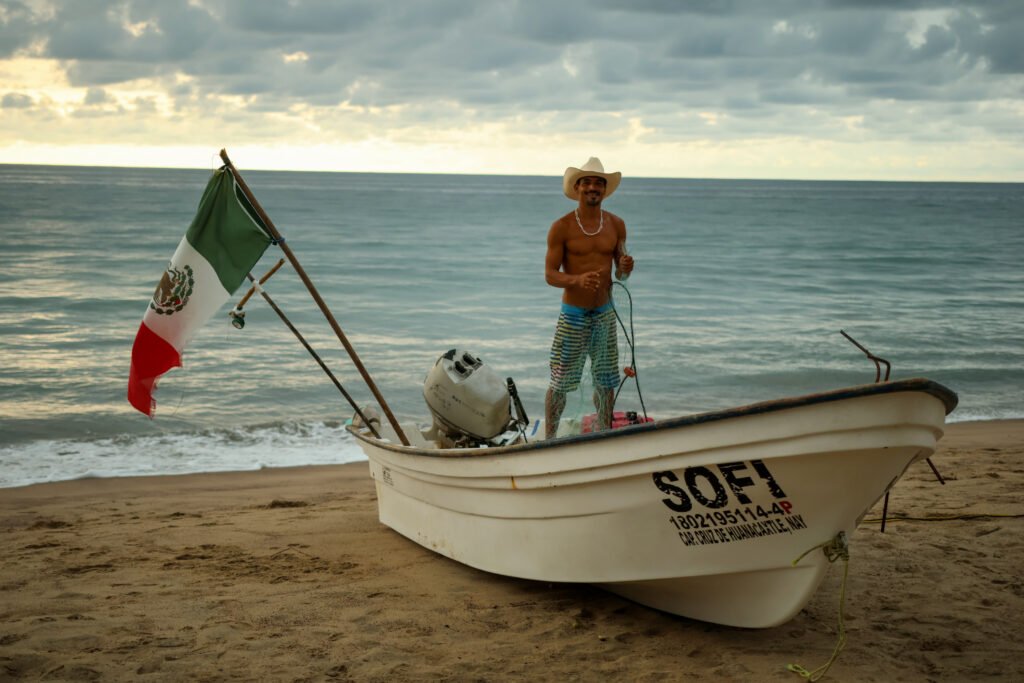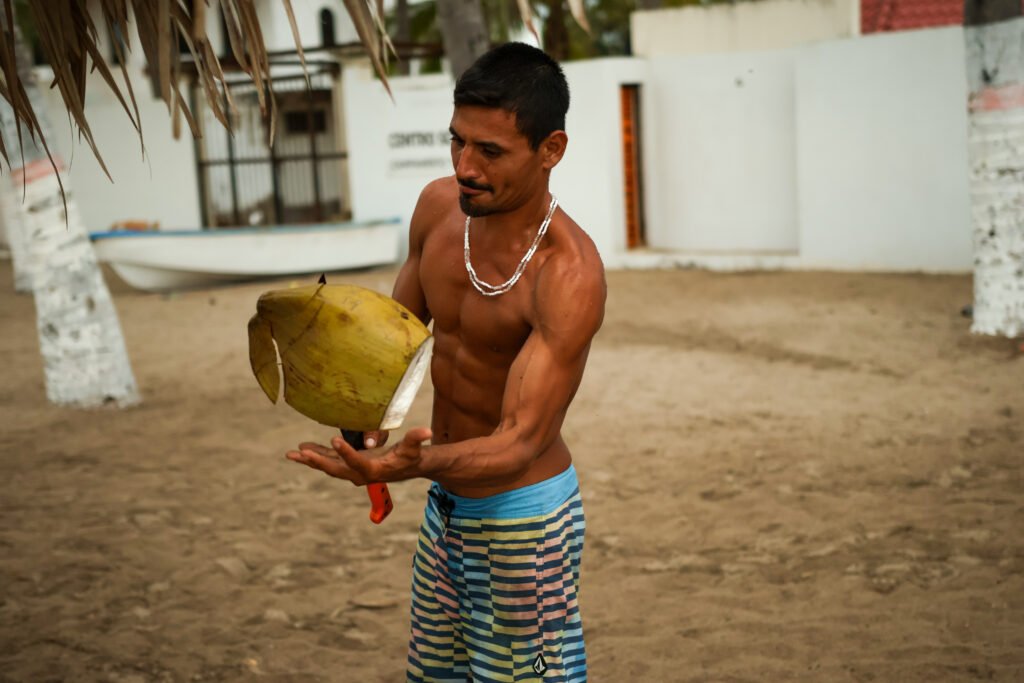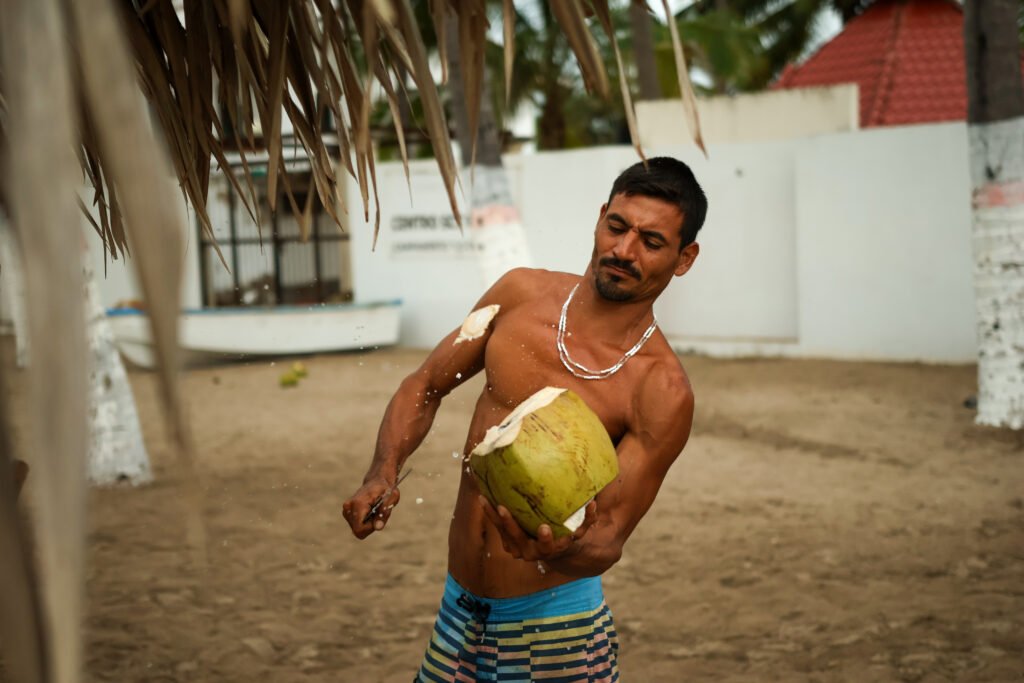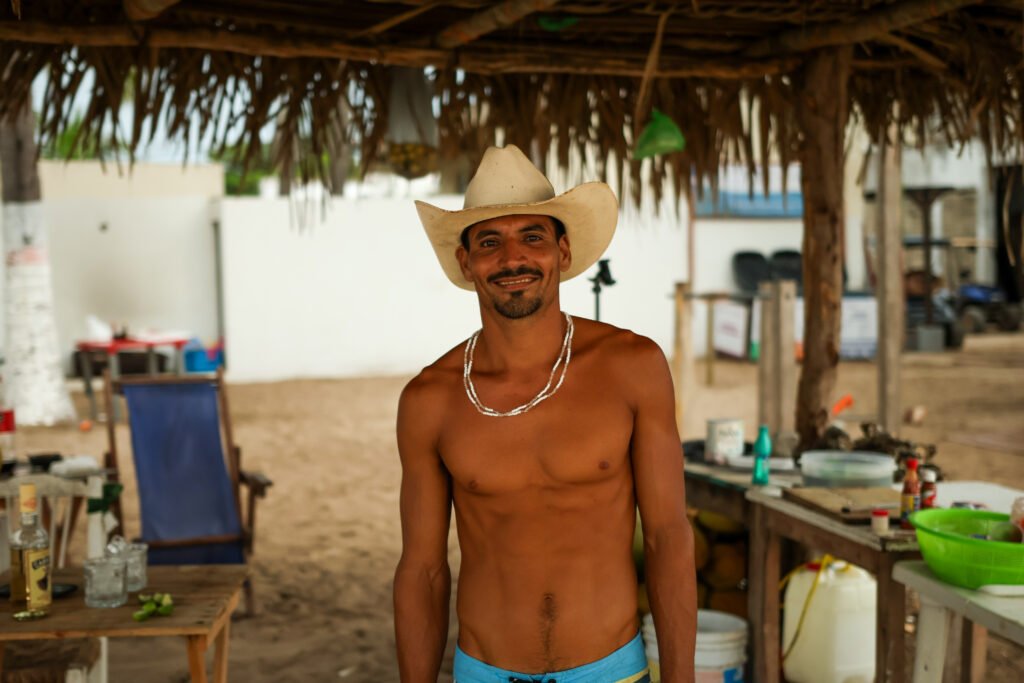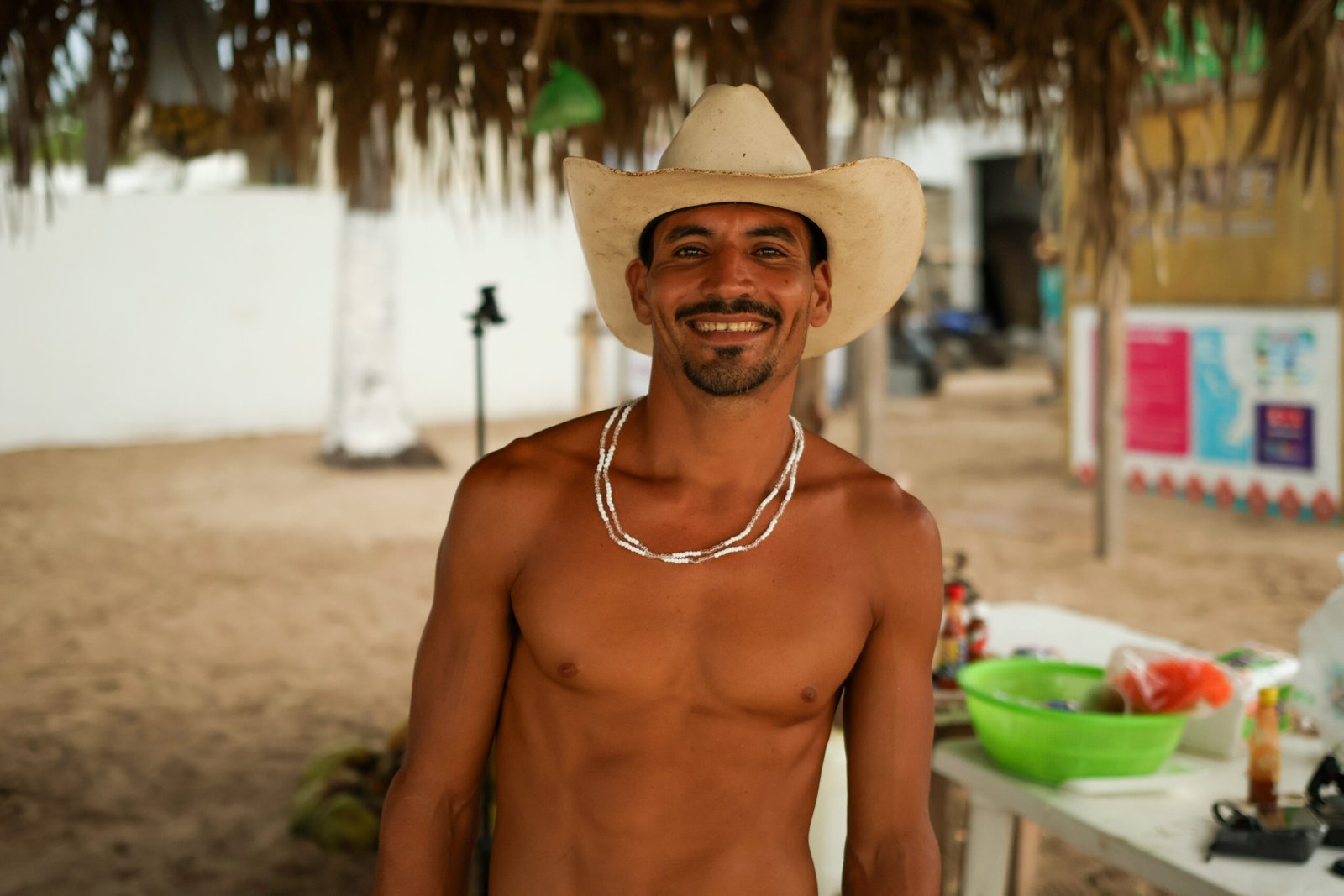We travel to Lo de Marcos, Nayarit — a coastal village where tradition, family, and the sea still define everyday life. Meet Beto, a coconut cutter, fisherman, and storyteller whose voice captures the soul of real Mexico. Through laughter, danger, and quiet reflection, Beto reminds us that resilience grows from roots. From saving a crocodile in the surf to honoring elders and raising his children with the same values he learned from his mother and sisters, his story is a living portrait of Mexican identity — grounded in family, land, sea, and spirit.
Some stories are carved by the ocean and held together by family. From the smell of salt and soil, from the rhythm of the tides, from family names carried like prayers. It’s waking up with the sun, working with your hands, honoring elders, and keeping traditions alive even as tourism and modern pressures roll in.
There are people whose strength doesn’t come from ambition or wealth — but from the earth itself. Meet Beto: coconut cutter, oyster diver, fisherman, neighbor, storyteller. A man who believes that joy comes from the land and courage from the heart.
“My days, as always, are wonderful. The kind of day you have depends on you. The difference between a good day and a bad day is your attitude. So, up to now, my days have been wonderful.”
For Beto, resilience isn’t a concept, it’s a choice made every morning. You wake up, face the sea, and decide: today will be a good day.
“So, it’s up to you to make the day good for yourself and sometimes for others, or to make it bad. Just as you treat others, they can treat you the same. So don’t complain…don’t complain”
In Lo de Marcos, Nayarit, a quiet stretch of Mexico’s Pacific coast, Every morning, the sun rises over the palms, and Beto begins again — coconuts, oysters, and a kind of joy that can’t be bought.
He’s part of a rhythm that most of us have forgotten.
“My main work, what I dedicate myself to, is cutting coconuts and selling them. The other is collecting oysters and selling those too. What does that have to do with Mexican culture? A lot. Why? Because we still have that art — climbing the palm tree, cutting your own coconut, opening it, and if you want, adding a bit of tequila. Life gets even happier with tequila. That’s one of the connections we have. And fishing — we’re fishermen. Fish is an incredible food, and with it, everyone ends up happy.”
Beto’s world moves at the pace of the sea, not the clock. This is authentic Mexico, a vida sencilla, where simplicity holds something rare: balance. In his small coastal town, paradise isn’t an idea but a way of life, heard in the laughter of fishermen, felt in the music from the plaza, and carried by the slow tide that bears the stories of generations.
“This is a paradise, for me and for everyone else. First, because the people are so kind, truly kind. Second, it’s like I always say: we have everything. If you feel tired or stressed, go for a walk, go for a swim, go see the cows, the chickens, the goats. There’s everything in this little community, and everything is valuable — from the rivers and the sea to the mountains. There’s always something the day gives you as a gift. So, as people, we just have to pay attention to what it’s offering us.”
He calls his town a paradise, not because it’s perfect, but because it gives you everything you need: work, nature, and time. But paradise, like everything sacred, must be protected, and that’s where Beto’s story turns.
One morning, a call spreads across the beach: a crocodile has washed ashore, weak and tangled near the surf. Most people would stay back. Beto steps forward. This isn’t just a wild moment; it’s a metaphor for courage, service, and community.
“The crocodile we caught was just over four meters — about 4.2, maybe 4.5 meters long. It was a bit injured. And because of the rain and the sea, they move slower — the salt makes them sluggish. But in the end, we released it back.
“Well, this area is a wetland zone. There are crocodiles around here. As a local and a volunteer, I’m always looking out for people. Some folks come and get into the ocean without knowing, but we’re here simply to help.
“It was moving between the edge of the sea, back and forth. When I arrived with my friend, I said, ‘Hey, this one’s tired — he can’t move. You grab him.’ And my friend said, ‘No, you grab him!’ The crocodile was tired, sick, you could say — it couldn’t move, couldn’t do anything. Its only defense was to open its mouth.
“So my reaction was to grab the crocodile and pull it out, because in the sea, you can’t really check how it’s doing. But when you see an animal that’s hurt—like all Mexicans—you just want to help, right? Even if it’s injured.
“When we got it out, the people from town helped us. Later, we called the biologists from Civil Protection. They came, took the crocodile, and relocated it to the area it had come from, since it was already tagged.
“And well, those are beautiful experiences, because we have that connection—again, the connection with animals, with people, with the land, with the sea. And if that crocodile is there, it’s because it’s part of your spirit, your…It’s that you have linked into your connection. That link between the sea and the earth. It’s like an instinct that says, ‘Hey, I need help, please.’ And you respond, ‘Okay, I’ll help you.’”
But paradise is fragile. Modernization and tourism can bring jobs, but they can also erode traditions, privatize beaches, and price people out. This is the tension in many Mexican coastal towns today.
“Well, yes, honestly, yes. There are some areas, you might have noticed it yourself, like in Vallarta, where hardly anyone fishes anymore. There are certain places where you can fish, others where you can’t even swim, and sections of beach that have been privatized.
“It’s not legal, but unfortunately, the one with more money is the one who calls the shots. So, even if we don’t have much, we’d rather protect the resources we have. Why? So that no one else comes and takes them away from us. That’s the small, but powerful truth.”
He’s honest: this change can’t be stopped overnight. He knows that preservation begins not with policy, but with people. Therefore, resistance becomes care—care for each other, for elders, for the ocean, for the land.
“It’s a kind of development that, even if we wanted to, we won’t be able to stop. Because there are people way above us, with more power. But we also have the power to unite again — as always — as a community, as a town. And yes, it does feel a little sad, but hopefully it won’t come too soon. Salud! [laughs]
“I think the way forward is by coming together, as always. Uniting — and above all, reaching out to the government to see if they’ll help. But, well, that’s the real Mexico. Here, the more you have, the more you’re worth. For now, it’s about giving it our all and not letting ourselves be defeated. And when we’re about to do something, we should always talk, ask for options. Because maybe it doesn’t affect me, but it might affect my neighbor. So the more connection there is between friends, between people, the better chance we have to solve the problem. We have to talk among ourselves, among the community.”
When Beto talks about strength, he doesn’t mean muscles — he means family. He was raised by nine sisters and his mother who taught him that men don’t just provide — they protect, they love, they serve.
“…I was raised among women, only women, and they always reminded me: ‘Hey, my son, you’re the man of the house. You always have to be strong. You can’t say you’re tired. So get up, shake it off. You can’t cry, you can’t do any of that.’
“They also taught me how to treat women — which is a very delicate topic these days. But really, it’s quite simple. In the end it’s very easy. Why? Because I was raised by teachers, so to speak. They’re the teachers of life, the ones who have the power to give life itself. That’s why it’s something truly incredible.”
In his Mexico, children and elders are the center. Identity isn’t just national—it’s intergenerational. And when he talks about the heart of Mexico, he doesn’t point to a map. He points to a table, a grandmother’s tortilla, a child’s laughter, an aging father being cared for — not forgotten.
“The most important are the children and the elders — because thanks to them, we are where we are. The family, the power of family.
“Why? Because family — you know this — family, whether good or bad, will always be your family.
“And our children, one day, will take care of us. Here in Mexico, that’s how it is: ‘My son, so that he can take care of me.’ And the grandfather — you always take care of him, because he was the one who brought us into this world. He’s our god, our elder, our leader — and we take care of him.
“And when he dies, that’s why we celebrate death — so we can go see him again. Celebrate his life, his spirit, yes. They’re small things, but very big things at the same time.
“And these are the kinds of things that some people don’t understand — how, how, how Mexicans can be so happy even when all these things happen to them.
“And it comes back to the same thing: we find the flavor in life.
“If you don’t have something, add salt and lime, and down it goes.
“Simply find the flavor in life — good or bad.
“The real heart of Mexico lives in the family. That’s where people should start — right there.”
For Beto, family isn’t just where you come from — it’s where Mexico begins. The same love that holds a family together is what binds a nation: generosity, humor, resilience, and the belief that no matter what comes, you face it with heart.
“For me, what it means to be Mexican is being a cabrón chingón, a badass, without limits. Whatever you want, whatever it is, there’s nothing impossible for a Mexican. Nothing. There’s nothing impossible. That’s it. It’s another level, another level.
“Why? Because, again, we were taught not to have maybe those comforts, those luxuries that we wanted when we were kids. But now, I mean, those aren’t luxuries. Luxuries are like this: enjoy your life. These are the luxuries. That’s right.
“That’s why being Mexican is another level, eh. It’s like… no, honestly, excuse my words, but it feels chingón (badass). That’s something you already carry inside — you feel it.
“A Mexican, you can easily yell at one — yeah, if he knows, if he’s Mexican — you can give him a guaco (what we call a shout), ah, that we all have. You shout to one, and the other answers back. It’s like this tremendous connection between Mexicans, and that’s unique.
“And it’s chingón, really — it’s chingón to be Mexican. Bronze skin — another level. Truly another level. And I think many would like to be Mexican.
“We have the virtue of being Mexican. Thanks to the one above, thanks to God.”
In Beto’s world, tequila is never just alcohol, it’s spirit made visible. It’s a cultural symbol—a story in a glass—agave, sun, labor, and memory. Beto sees tequila as valor y verdad: courage and truth.
“For me, tequila represents that connection with the soul — because sometimes it even makes you cry. It makes you cry. You start drinking, doing the typical thing for a Mexican: listening to your music. But sometimes those sentimental songs come on, and that’s when you start thinking — like, what am I doing? Where am I going?
“You come back to the same thought: I have everything, but, well, like that verse says — there’s a line in the Bible that says, ‘What does it profit a man to conquer the world if he loses himself?’
“So we have that courage. We have that courage, as men, to conquer the world. But if we lose ourselves in the process, then it’s worth nothing.
“It’s the same with tequila. We can be drinking two or three, calm, enjoying it — but when we lose ourselves with tequila, then yeah, hold on, because that’s when the devil’s coming. Hold on — that’s the small, big detail.
“But tequila helps us a lot to connect with the spirit and the soul.”
There’s poetry in his words. The same tequila that gives courage on the dance for or at the bull ring also opens the heart to cry, to love, to forgive.
“Tequila gives you your own courage because when you’re already, well… you no longer, let’s say, have hairs on your tongue (you stop holding back). Whatever you’re thinking — it’s like, okay, I’m thinking it, you ask me, or you’re hinting at it, then let’s go.
“One of our things is the jaripeo (the rodeo). In the jaripeo, people are drinking — either tequila or beer. There’s always a show of riding bulls. You drink one, two, three tequilas so that nervousness you have — let’s say it’s because of nerves — goes away. That’s what I mean when I say it gives you courage. The fear disappears, and you go for it, whatever comes next. That’s why it takes away your fear — it gives you courage.”
For Beto, that courage extends beyond celebration—it touches the way Mexicans face life and death themselves.
“I think we Mexicans are almost the only ones who celebrate death. In fact, I think we even treat her like a comadre — like a godmother, one of the family. Why? Because everyone else is afraid of death. Mexicans aren’t. We Mexicans even drink tequila with her — we know it, even with her.
“When things are good, when you’re happy — we go back to the same thing — you open a bottle to feel good, to enjoy yourself. Why? Because something went well for you, whatever it was — doesn’t matter — but you’re happy. We celebrate.
“And when things go bad — the car breaks down, a coconut falls on your windshield, you run over a dog, or you get hurt, scrape yourself — a lot of people go, ‘Why, why?’ Uh-huh. But time — time is perfect. There’s a reason you had to stop, to pause.
“So, if things go wrong, then laugh. Why? Because if you get angrier, you’ll only get even angrier. So no — you have to laugh. ‘Okay, this happened to me. I’m going to find a way to move forward, to change the plan, to change the role.’ Why? Because it didn’t work out.
“So if you fall, shake it off and laugh — laugh that nothing really happened. On the contrary, laugh and find the flavor in it. That’s the main thing — they can’t stop us. That’s what finding the flavor means.
Because whatever people say, whatever happens, everything happens for a reason. And we come back to the same thing: if it happened, take it calmly and enjoy it — because things happen for a reason. And laugh — there’s no other way. It’s just a moment, just a moment — and we’re only passing through.”
Tequila, like life, holds both sweetness and burn. For Beto, it’s proof that even in loss or struggle, there’s something to taste, something to laugh about, something that keeps you moving. And his favorite?
“My favorite tequila is Cabrito. That one — Cabrito, here it is. Cabrito, so you can try it — I invite you, it’s very good.
“One of my favorites because I used to see my grandfather drinking a lot of it. So, besides that, my childhood was spent around goats, so I’d always be like, ‘Hey, what’s up with this — why do they always have this one?’ And now it’s like, ‘Okay, I’m going to have a Cabrito, let’s see what happens.’ So, very, very good, whatever it is.
“And the other thing is that when I traveled abroad, I was looking for a tequila, and what I never expected was to see Cabrito there, overseas. But it was! And I was like, ‘Ah, another crazy goat, another chiva loca out there.’ [laughs] So yes, I invite you — cheers!”
At the end of our conversation, Beto smiles. There’s no speech, no drama — just pride.
The kind that doesn’t need words because it’s lived every day.
“I think we have a very beautiful place. As Mexicans, we have… the richest cultures. We’re all different, but we all share the same mindset — to be happy, to help each other, to find joy as always.
“Parties… you know that Mexicans always have parties. We love freedom, and that’s why Mexico is a free and sovereign country, where everyone can live freely, can enjoy life however they want. One of the best countries in the world, I think, is Mexico. I’m happy to live here — I like it a lot. We have everything — every kind of climate: snow, deserts, tropics, beaches. We have the best.
“And hey, know how to make tortillas, huh! Oh yes, you have to know how to make tortillas! The country of the tortilla, eh. The country of the tortilla is on another level. It’s our strength — just like, let’s say, the Chinese have their rice, we have the tortilla. And tacos — and tacos, of course, because tortillas mean tacos. Cacao, too — they are one of the things that make chocolate, exactly. These are some of the things that Mexico gives to the world.”
Beto’s message is simple: Mexico is abundance, not just in beaches and mountains, but in people, culture, tortillas, cacao, and care. Because to know Mexico isn’t to study it. It’s to feel it. To live it. To defend it.
“We need to protect Mexico and defend it at all costs. Why? Because we have the best. From tequila to cacao — we give to the world, and everyone enjoys it. Our gastronomy, our food, the best. The best gastronomy in the world, no matter what.”
So here’s the invitation—from Lo de Marcos to wherever you are: cherish your roots, protect your places, choose community over convenience, and raise a glass not just to party—but to remember who you are.
“Everyone is very welcome here in Lo de Marcos. Here’s your friend — they call me Beto Palmas. And whenever you want to come, we’re here.
We’re Mexicans. And well, come buy a coconut, huh? We’ve got coconuts, oysters, pineapples, fish — everything. Remember that Mexico is 100% natural.
And if you don’t believe me, take a sip of tequila… and then we’ll talk. Salud otra vez. [laughs] Salud.”
